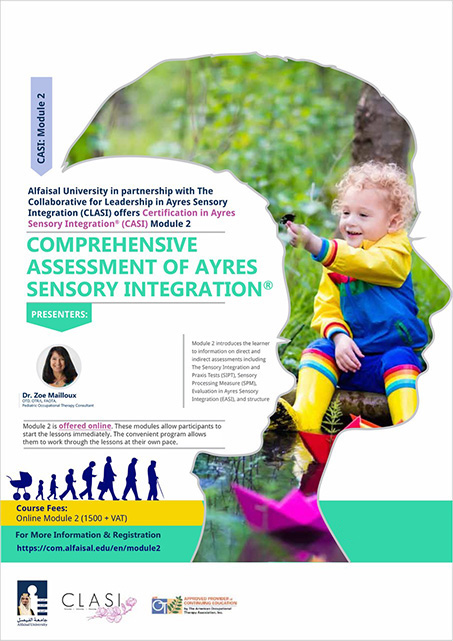CASI: M2 COMPREHENSIVE ASSESSMENT IN ASI

Module 2 is a set of 20 lessons aimed at introducing and orienting the learner to the scope of comprehensive assessment in ASI, including specific methods for assessing core sensory integrative functions and planning intervention when applying the ASI framework. Learners are introduced to information on direct and indirect assessments, including the Evaluation in Ayres Sensory Integration (EASI) (Mailloux, Parham & Smith Roley, 2016, in process) and the Sensory Integration and Praxis Tests (SIPT) through www.wpspublish.com.
For Registration & Enquiries :
(+966) 541444457
DATE AND LOCATION: You pick! Register for the online course and start the lessons immediately. The convenient program allows you to work through the lessons at your own pace.
WHO CAN TAKE THIS COURSE: Module 2 is open to healthcare professionals with at least a bachelor level equivalent college/university degree in occupational therapy, speech pathology, physical therapy, psychology, or medicine. Module 2 is a prerequisite to Module 3.
LEARNING OBJECTIVES. After the course, participants will be able to:
- Describe an assessment plan for a client
- Describe the evaluations appropriate to assess ASI constructs in all areas
- Analyze the psychometric strength of the evaluations
- Reliably administer the EASI, SIPT, and SPM
- Understand the constructs tested by sensory related measures
- Design clinical observations of sensory integration constructs when standardized measures are not possible
- Demonstrate competence in the application of clinical observations based on ASI
- Identify whether an evaluation report meets the standard for structural elements on ASI Intervention Fidelity Measure
REQUIREMENTS AND ASSIGNMENTS: Click here to view requirements and assignments for each CLASI module and the full CLASI Certificate in ASI program.
Course Fees: Online Module 2 (1750 + VAT) Online Enrollment is open
REQUIRED MATERIALS
To receive the final certificate, learners must document the completion of a comprehensive assessment of sensory integration with at least two typically developing children and one child who has been identified as having concerns. Due to the accessibility of the EASI in terms of cost, age range, and international applicability, the main assignments of the program will be geared toward these newly developed tests. A checklist of items needed for learning, practicing, administering, and scoring the EASI will be provided in the resources section of CLASI's assessment Modules (Modules 2 & 3).
Participants in the CLASI CASI who have access to SIPT materials and who wish to test children on the SIPT as part of the case requirements may do so. Therapists will be guided through the interpretation process with the tests they apply and through cases provided in the modules.
COURSE INSTRUCTOR: Dr. Zoe Mailloux, OTD, OTR/L, FAOTA
CONTINUING EDUCATION UNITS:
 Module 2 will provide 30 hours of training including the assignments. CLASI is an approved provider of continuing education units (CEU) by the American Occupational Therapy Association. The following AOTA CE Classification Code applies to M2: Occupational Therapy Practice.
Module 2 will provide 30 hours of training including the assignments. CLASI is an approved provider of continuing education units (CEU) by the American Occupational Therapy Association. The following AOTA CE Classification Code applies to M2: Occupational Therapy Practice.
ASYNCHRONOUS ONLINE FORMAT: Register for the online module and start the lessons immediately. The convenient program allows you to work through the lessons at your own pace.
The online platform guides you through the lessons, supplemental videos and assignments. The user-friendly system allows you to create your own account to manage all of your CLASI modules. You must have internet access that allows streaming to complete the lessons and must use an approved web browser. We recommend Safari, Microsoft Edge, or Firefox. Google Chrome and Internet Explorer are not supported. Online lessons are available for one year from the date of purchase, allowing you to return to the content to review and refine your understanding.
Click Here to RegisterCancellation Policy: There will be no cancellations/refunds offered after user has accessed the learning management system. In the case of emergencies, we will consider on a case by base basis.













